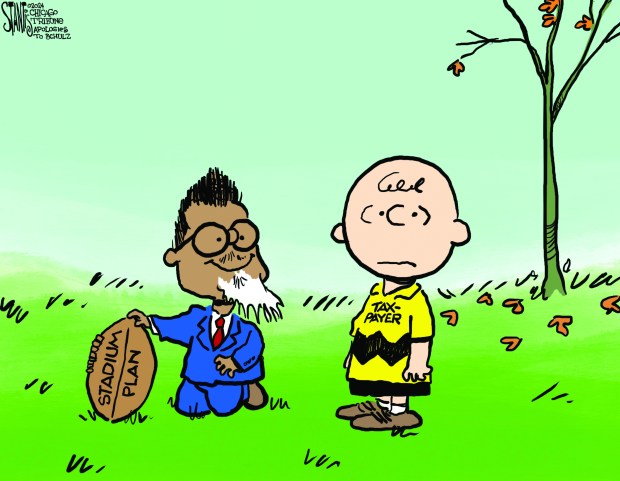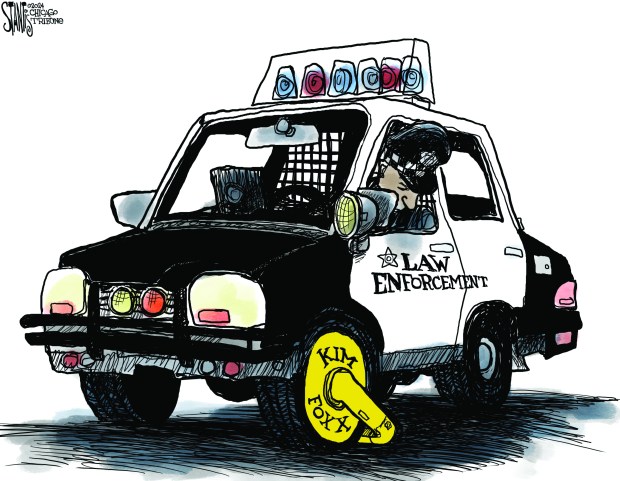Are professional sports stadiums cost-effective drivers of economic growth?
Mayor Brandon Johnson sure thinks so, at least as it pertains to the Chicago Bears’ proposal for a domed stadium on the city’s lakefront. In cheerleading for the project, which would couple about $2 billion in investment from the team with more than $1 billion in upfront taxpayer assistance (far more over time as bonds floated to finance that amount are serviced), Johnson has touted 24,000 jobs for the city of Chicago, including 2,300 permanent ones.
So why have the flashy visuals of a football palace accompanied by ballfields and other public amenities been met with overwhelming negativity not just from the governor and his senior staff but also state lawmakers, lakefront protection advocates and even sports talk-show radio hosts? First, of course, there’s the distasteful optic of yet another uber-wealthy sports franchise groveling for taxpayer subsidies. But not to be overlooked is the skepticism over whether sports stadiums generally — and this one in particular — are economic game changers.
The revealing, narrative-driving report released nearly a year ago by Johnson allies, titled “First We Get the Money,” truly has turned out to be one of the few consistent philosophies Johnson has followed in his chaotic first year. His revenue-raising efforts generally have sputtered, most notably voters’ rejection of a referendum to quadruple the tax on sales of residential and commercial property over $1.5 million in order to fund homelessness programs. But he shows no signs of shifting course.
So given that Chicago taxpayer rejection, it surely was appealing to Johnson that one of the benefits of the Bears’ proposal was the dearth of city tax subsidies — at least direct ones — needed to make it happen. The city would “get the money” not from its own taxpayers but from bonds floated by a state agency. Likewise, Chicago government tills wouldn’t furnish the $1.2 billion needed for those playing fields and other amenities depicted in the beautiful renderings. State and federal grants, or other funding to be named later, would cover the public benefits.
Of course, Chicagoans also happen to be Illinoisans and pay plenty of state taxes as well as local ones, so ultimately they are on the hook for a good chunk of this largesse. But that wasn’t part of the Johnson sales pitch.
As in other past situations, such as the migrant crisis confronting the city and state in the fall and winter, the Bears’ stadium plan has required Gov. J.B. Pritzker to overrule Johnson, in this case like a parent at the grocery store telling their kid to put the candy back on the shelf. Pritzker administration officials told Bears’ execs last week that their plan was a “nonstarter.” Merriam-Webster defines nonstarter as “someone or something that is not productive or effective.” In essence, the governor instructed the Bears team, and by proxy Johnson since he is on board with this exact plan, to try again. With something completely different.
The Bears aren’t politicians. They have to win games, not popularity contests. For Johnson, on the other hand, the public thumbs-down to a project he touted as transformational for the city of Chicago marks another humiliating rebuke. Not only have Illinois’ powers-that-be declared this plan dead on arrival, portions of Johnson’s progressive base have recoiled as well, wondering why the mayor they thought was going to make the well-to-do pay more to finance benefits programs of all sorts now is beating the drum for taxpayer cash to make the wealthy — NFL owners — even wealthier.
The political fumbles we’ve seen in the stadium rollout aren’t even what’s most disappointing to us. The revelation, unsurprising as it is, of a mayor who thinks a thriving city economy relies on the public sector — or in this case a public-private partnership, to put it euphemistically — to make multibillion-dollar investments in return for a few thousand permanent jobs (if that’s even the correct number) puts on display a lack of understanding of what generates genuinely productive business activity.
Johnson has shown little interest, with one notable exception, in making Chicago’s business environment more favorable for private-sector investment.
That exception, and the mayor deserves praise for it, is an effort to cut city-government red tape for housing developers. Chicago’s permitting system is byzantine, and streamlining it is a worthy goal. Other mayors have tried it and largely failed. We’re rooting for Johnson to succeed where they didn’t.
But public works — particularly those favoring well-heeled business interests in no need of subsidy — often aren’t a significant driver of economic growth. To be sure, some can be crucial linchpins. For example, transit stations are reliable hubs around which businesses and household formation can take root and expand. But, without additional private-sector investment, the stations are merely modest job generators.
This Bears stadium strikes us as a particularly costly version of that dynamic. How will a massive replacement structure set apart on parkland on which no one else can build and removed from the rest of the city by DuSable Lake Shore Drive promote economic growth beyond its operation? (And, no, we’re not counting a Super Bowl coming once every two or three decades.)
Numerous studies have demonstrated that massive public investments in professional sports stadiums don’t yield commensurate benefits.
That’s what Pritzker, a business owner before he became a politician, understands in a way that Johnson clearly does not. Thankfully for all Illinois taxpayers, Pritzker will require any team’s stadium plan relying on public cash, whether that notion comes from the Bears or the White Sox or the Red Stars or whomever, to demonstrate a public benefit at least equal to the investment being made. Given the likelihood of cost overruns and future negative tax surprises, the standard really ought to be an independently appraised public and economic benefit significantly greater than what taxpayers provide.
Since the mayor already is on board with this DOA plan, he’s unlikely to be a major part of any real future stadium deal-cutting. He’d be better served developing more initiatives to make Chicago an easier city in which to do business, create well-paying jobs and attract visitors and diverse, talented young graduates. That’s by far the best way to “get the money.”
Submit a letter, of no more than 400 words, to the editor here or email letters@chicagotribune.com.





